PHD PROGRAMME
IN CONTEMPORARY
ARCHITECTURE
PHD PROGRAMME
IN CONTEMPORARY
ARCHITECTURE

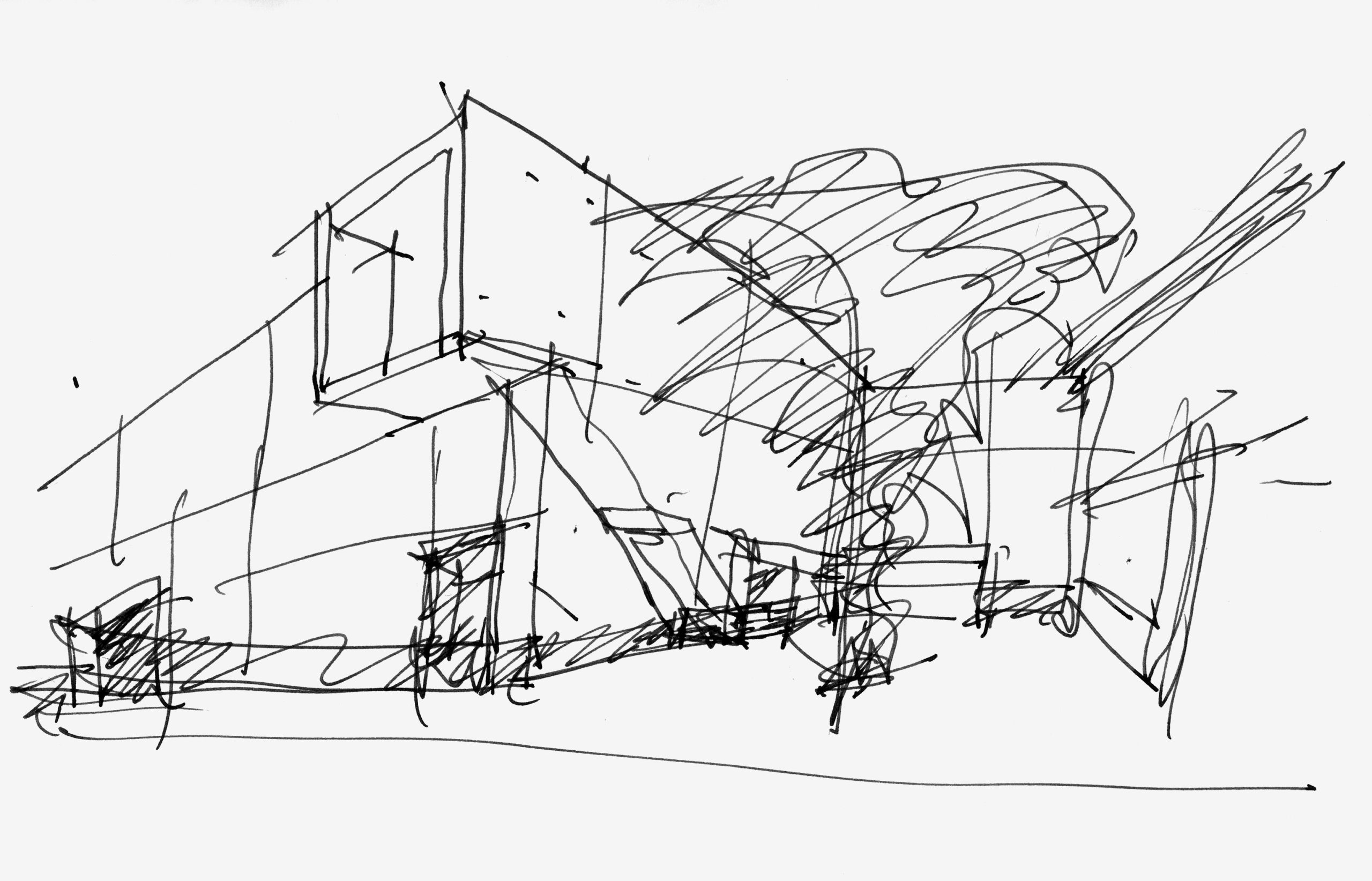
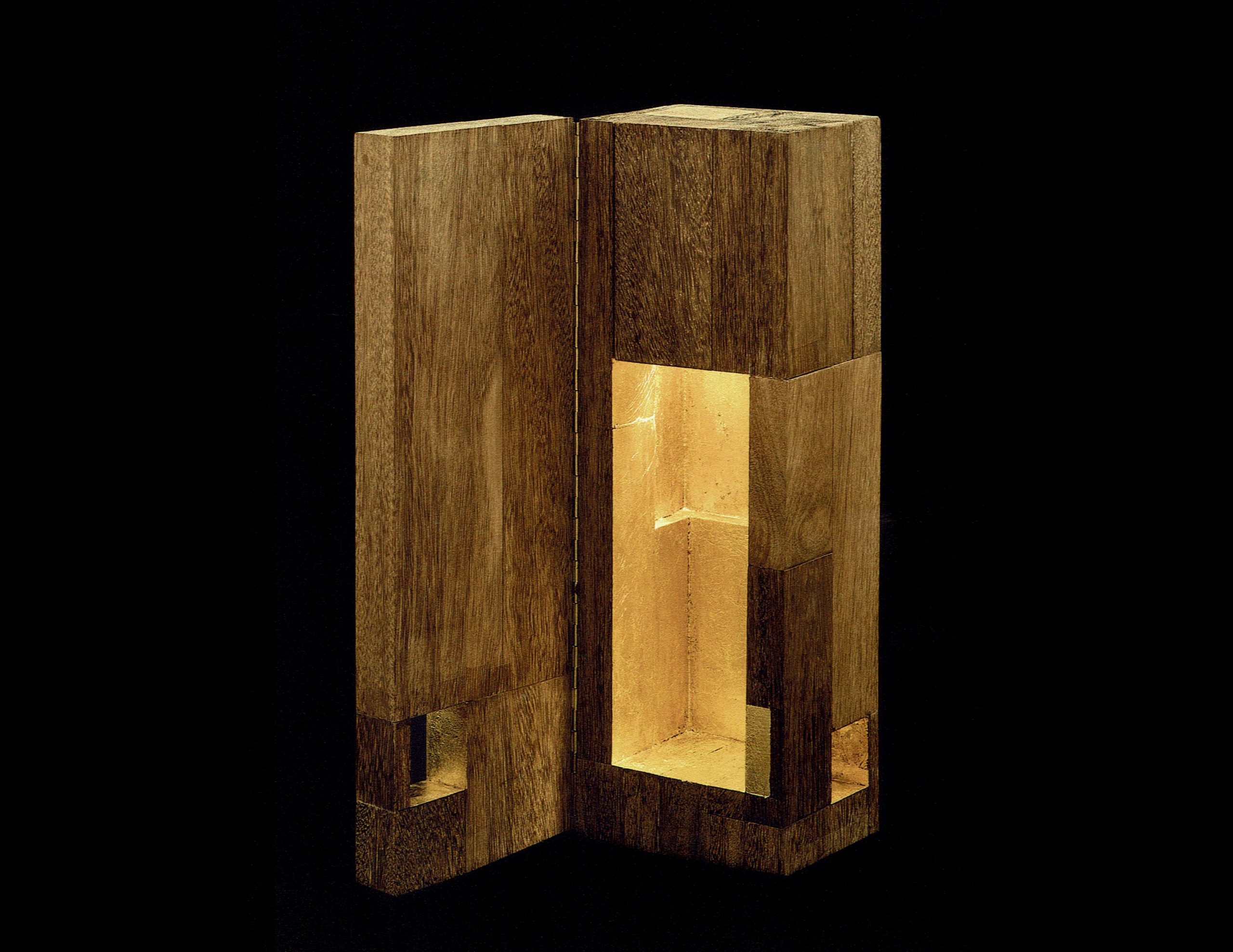
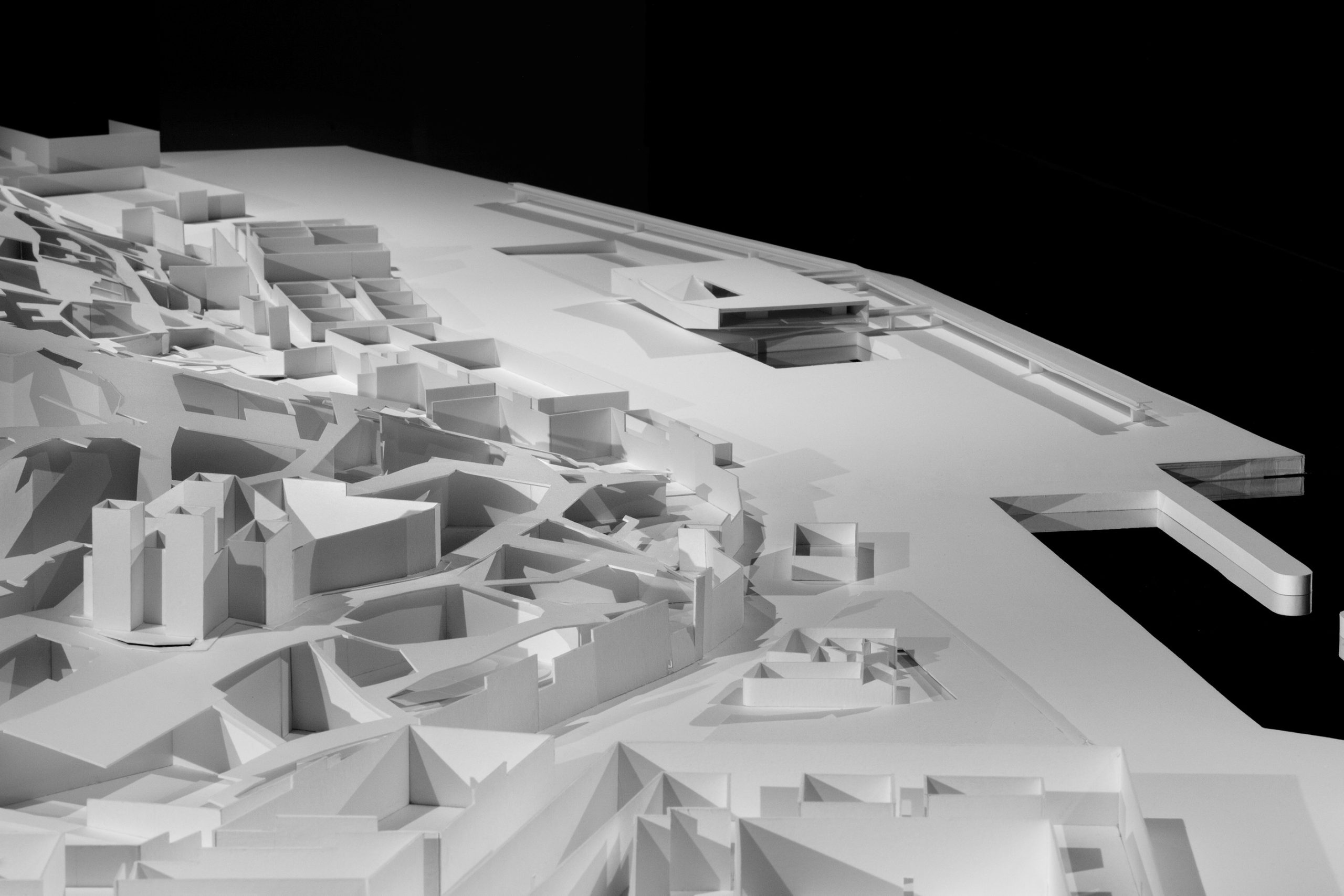
General Description
Although the reflection on contemporary architectural production and the challenges it faces has been taking place in a context of curatorial and editorial activity, it is being avoided in the academic sphere, traditionally devoted to the subject of the History of Architecture. The PhD course at the Department of Architecture in Universidade Autónoma de Lisboa (UAL) is precisely aimed at breaking with the distancing of academia from the present time – believing that the research produced in this field could become instrumental to the construction of what will, in the future, be the history of the times we are now living in. With the added advantage of being taught in a country where several leading authors work, this PhD promotes advanced research projects which advocate effective interaction between the reflection done in the heart of the university and contemporary architectural production.
Organization of the Programme
The full PhD consists of 180 ECTS, with 60 corresponding to the PhD course and 120 to the thesis preparation and defence, allowing students to complete their PhD in six semesters.
Semester 1
CONTEMPORARY
ARCHITECTURE SEMINAR I
350 hours/ T 15, TP 45 / 14 ECTS
/
SEMINAR ON CURATORIAL
PRACTICES
200 hours / T 15, TP 15 / 8 ECTS
/
RESEARCH AND DISSEMINATION
METHODS
200 hours / T 15, TP 15 / 8 ECTS
Semester 2
CONTEMPORARY ARCHITECTURE SEMINAR II
350 hours / T 15, TP 45 / 14 ECTS
/
SEMINAR ON EDITORIAL PRACTICES
200 hours / T 15, TP 15 / 8 ECTS
/
THESIS PROJECT LABORATORY
200 hours / T 15, TP 15 / 8 ECTS
/
THESIS PROJECT
Semester 3
750 hours / OT 60 / 30 ECTS
Semester 4
THESIS LABORATORY I
750 hours / OT 60 / 30 ECTS
/
PROGRESS REPORT
Semester 5
THESIS LABORATORY I
750 hours / OT 60 / 30 ECTS
Semester 6
THESIS LABORATORY I
750 hours / OT 60 / 30 ECTS
/
THESIS DEFENCE
Students who have successfully completed the course units for the first two semesters, equivalent to 60 ECTS, may request a Diploma of Advanced Studies in Architecture. The PhD is awarded to those who have obtained 180 ECTS credit units through successfully completing their advanced studies (60 ECTS credit units) and thesis preparation (120 ECTS credit units), including its defence and approval.
COORDINATION
Ricardo Carvalho and Marta Sequeira
FACILITIES
This course will take place in the facilities of the UAL Department of Architecture in Campo de Ourique, Lisbon. The conditions there are in line with best international practices in scientific research (including access to a specific documentation centre on the scientific area of architecture and permanent workstations for each student, as well as spaces for collaborative research work).
START DATE OF THE THIRD EDITION
March 2025
COURSES
Semester 1
| Contemporary Architecture Seminar I covers the main goals of research production in the context of this PhD: (1) the transformation of architectural design, characterised by its uniqueness, into a vehicle for universal knowledge, and (2) the transformation of a process that is cryptic in nature, design, into stable encoding – into something that can be conveyed through writing – generating objective knowledge that is available to all. This course unit promotes analysis of the work done by some of the main contemporary players, with the aim of studying how works of architecture are created and investigating some of the theoretical and methodological assumptions architectural design is based on. Course leaders: Ricardo Carvalho |
| The main aim of the Seminar on Curatorial Practices is to explore the points of contact and permeability between curatorial practices and the actual act of designing architecture. The students will be challenged to reflect on the intellectual work that lies beyond the material nature of the exhibition, the ways of building narratives and the constellation of conceptual and procedural relationships that sustain the production of a curatorial project in the area of architecture. It is aimed at: (1) exploring the potential of curatorial practices as an analytic research tool and a means for formal and critical expression by the architect, (2) providing PhD students with a solid background in the practices, methodologies and lines of questioning in the field of curatorship, and (3) promoting the development of critical analysis, independent research and practical experimentation skills suitable for integration into the specific nature of PhD research projects. Course leader: Rute Figueiredo |
| The aim of Research and Dissemination Methods is to deal with the topics inherent to (1) general scientific research methods, (2) research methods in architecture in particular and, specifically, (3) research methods on the present time. The course unit explores some of the traditional approaches of the history of architecture, as well as others that have remained outside the conventional academic sphere. It explores the traditions arising from these approaches, as well as the controversy that has been generated around them. Course leaders: Nuno Mateus, Filipa Ramalhete |
Semester 2
| While Contemporary Architecture Seminar I began with an analysis of a concrete project, this course unit begins with an analysis of a topic, with the aim of stimulating the capacity for transversal analysis of a problem. The main goal of this course unit is to promote the analysis of some of the main contemporary topics, stimulating the intellectual autonomy of the students – as potential researchers in architecture, but also, and mainly, as potential architects. The intention is to build a privileged space for discussion at the highest level, with contributions from different disciplinary areas – sociology, geography, land-use planning, landscaping, urban planning, agronomy, territorial policies. Course leader: Marta Sequeira |
| The Seminar on Editorial Practices explores the vast field of architectural publications as a privileged place for the production and dissemination of academic discourse, throughout the 20th century and up to the present day. The goal is to explore the relationship between historical awareness and editorial practice and to guide intellectual preparation for the alternative activities in architecture, engaged in both by institutions of power and by the resistant fringes, both of which are almost always outside of academia. It is within this context that we have structured this course unit, whose main goals are to chart and assess the role of the main publications that have marked architectural discourse since the 20th century and to understand how editorial practice can be considered an essential tool for questioning and criticising architectural thought and action, while at the same time being capable of opening up new lines of action and thought. Course leader: Pedro Baía |
| The main aim of this course unit is to provide the students with the tools that will allow them to develop their abilities to manage, organise, develop and present an advanced research project in architecture, demystifying and implementing the concept of advanced training in architecture based on research into contemporary architecture. At the end of the course unit, students should have acquired the following skills: (1) the ability to define a research topic as well as the study object, (2) the ability to define the state of the art and explain the originality of the work, (3) the ability to define the methodology to be used, and (4) the ability to draw up the bibliography. This course unit is also aimed at providing support to students in the preparation of a funding request for their PhD research proposal. Course leaders: Marta Sequeira |
Semesters 3,4,5&6
These studies are aimed at stimulating participation in research teams, as well as the development of discussion and feedback mechanisms through attending advanced courses, participation in conferences and seminars, presentation of communications at scientific congresses and meetings, publishing articles in journals and working together on teaching programmes in the specific area of architecture. Independent student work and tutorials are prioritised during the final two years, thus complying with a policy of encouraging the dissemination of the results in international publications, as well as periods of research at national and international centres of high repute.
Academic staff: Filipa Ramalhete, Flavio Barbini, João Quintela, Manuel Aires Mateus, Marta Sequeira, Nuno Mateus, Pedro Baía, Ricardo Carvalho, Rute Figueiredo
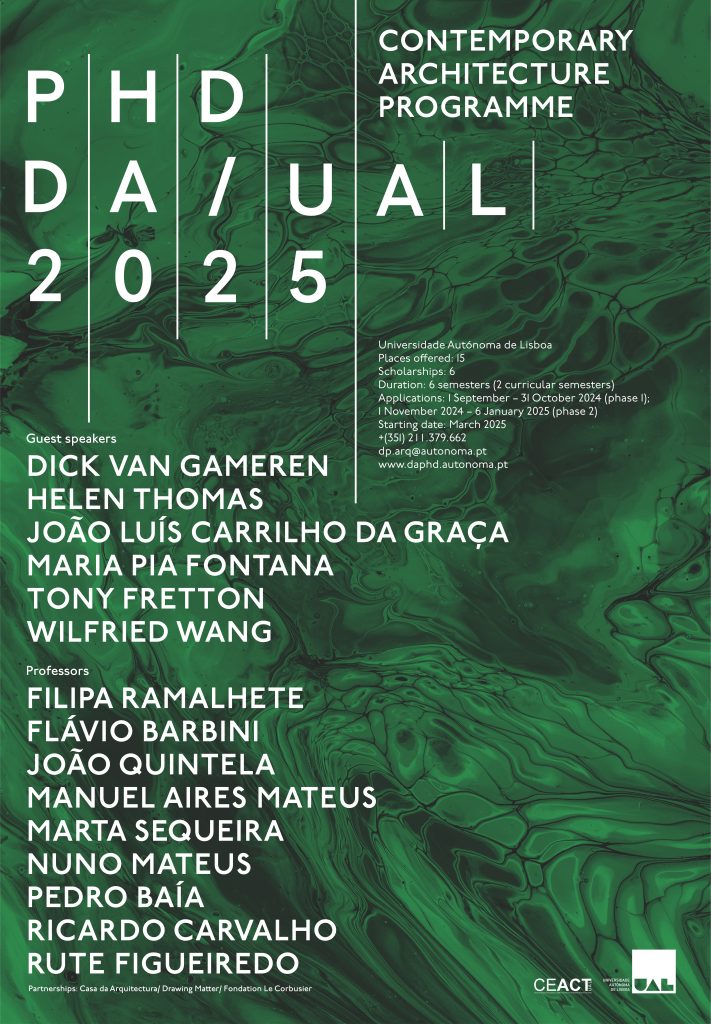
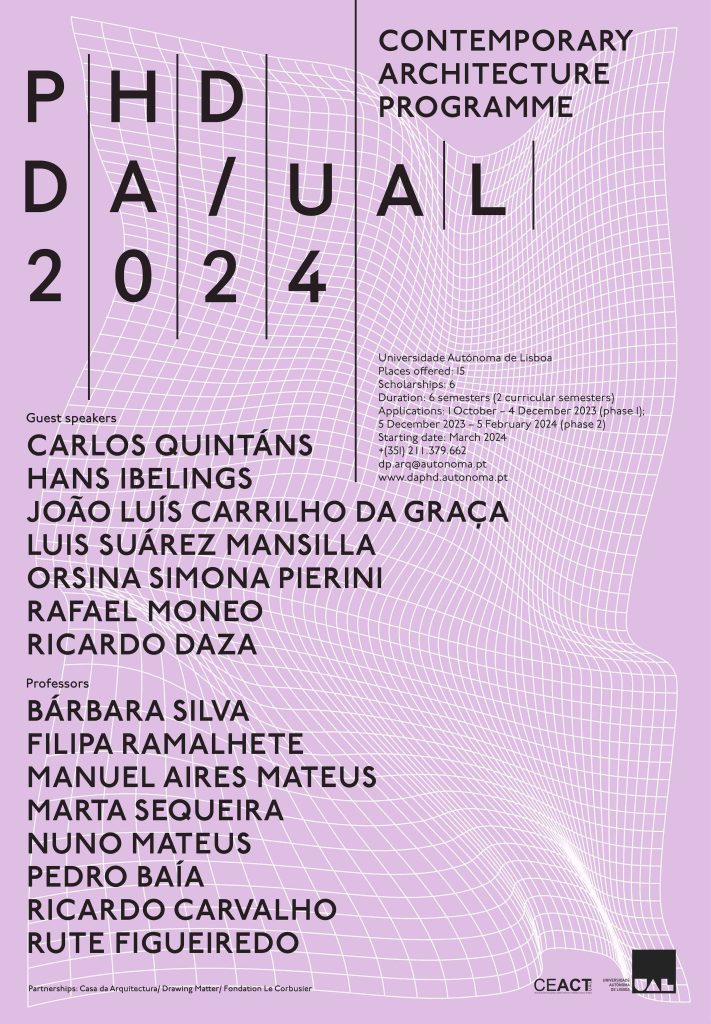
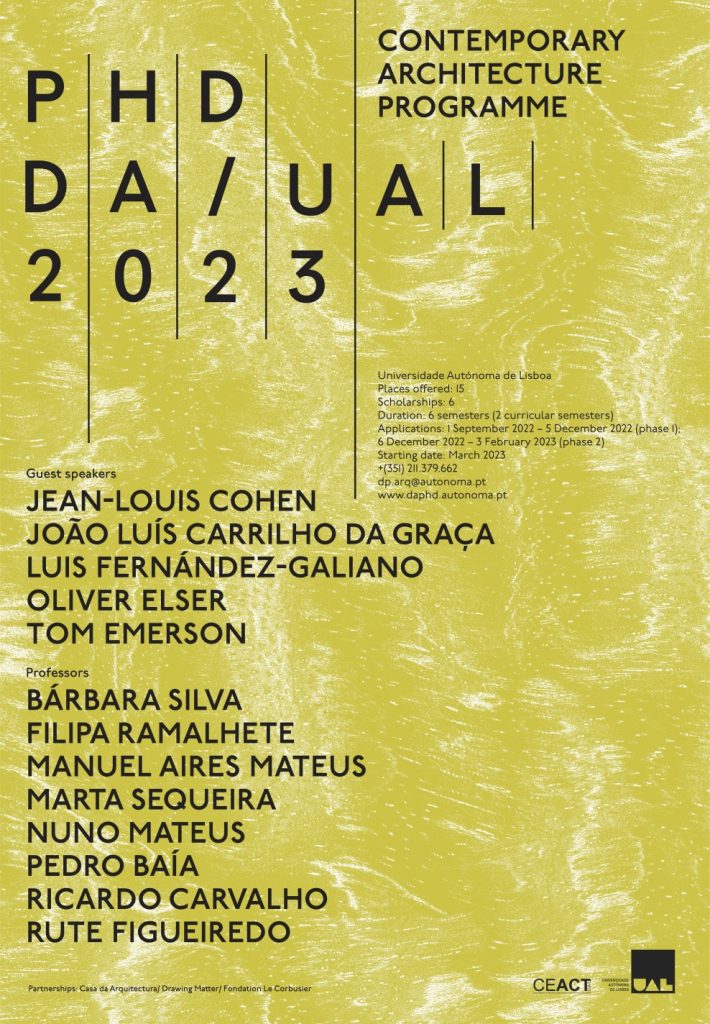
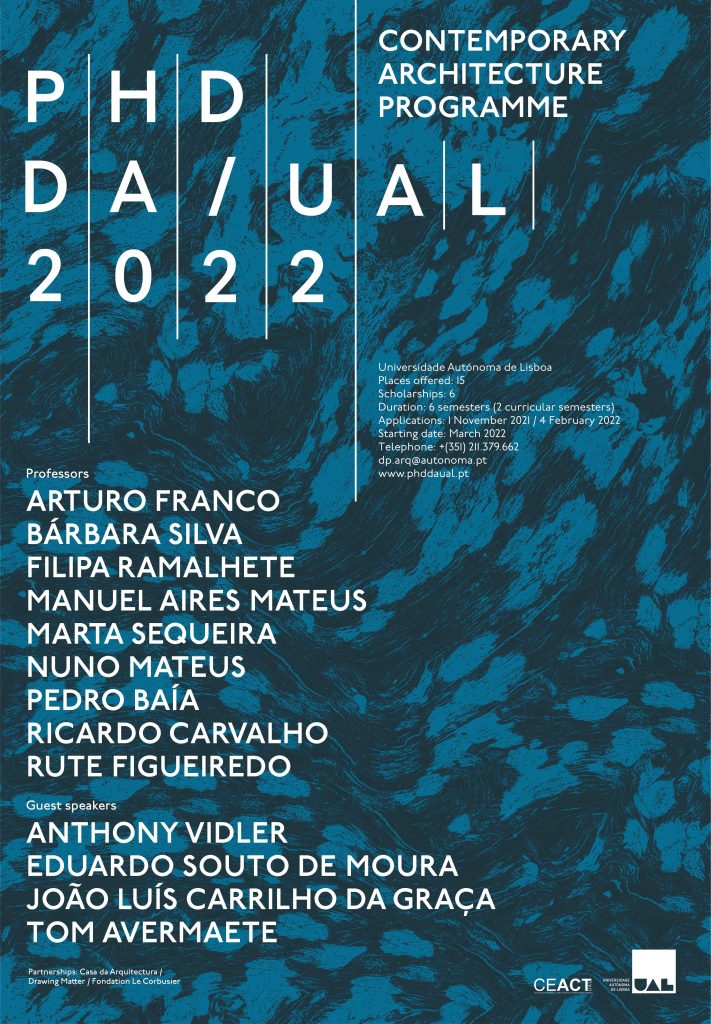
Contemporary Architecture Seminar I covers the main goals of research production in the context of this PhD: (1) the transformation of architectural design, characterised by its uniqueness, into a vehicle for universal knowledge, and (2) the transformation of a process that is cryptic in nature, design, into stable encoding – into something that can be conveyed through writing – generating objective knowledge that is available to all. This course unit promotes analysis of the work done by some of the main contemporary players, with the aim of studying how works of architecture are created and investigating some of the theoretical and methodological assumptions architectural design is based on.
Course leaders: Ricardo Carvalho
The main aim of the Seminar on Curatorial Practices is to explore the points of contact and permeability between curatorial practices and the actual act of designing architecture. The students will be challenged to reflect on the intellectual work that lies beyond the material nature of the exhibition, the ways of building narratives and the constellation of conceptual and procedural relationships that sustain the production of a curatorial project in the area of architecture. It is aimed at: (1) exploring the potential of curatorial practices as an analytic research tool and a means for formal and critical expression by the architect, (2) providing PhD students with a solid background in the practices, methodologies and lines of questioning in the field of curatorship, and (3) promoting the development of critical analysis, independent research and practical experimentation skills suitable for integration into the specific nature of PhD research projects.
Course leader: Rute Figueiredo
The aim of Research and Dissemination Methods is to deal with the topics inherent to (1) general scientific research methods, (2) research methods in architecture in particular and, specifically, (3) research methods on the present time. The course unit explores some of the traditional approaches of the history of architecture, as well as others that have remained outside the conventional academic sphere. It explores the traditions arising from these approaches, as well as the controversy that has been generated around them.
Course leaders: Nuno Mateus, Filipa Ramalhete
While Contemporary Architecture Seminar I began with an analysis of a concrete project, this course unit begins with an analysis of a topic, with the aim of stimulating the capacity for transversal analysis of a problem. The main goal of this course unit is to promote the analysis of some of the main contemporary topics, stimulating the intellectual autonomy of the students – as potential researchers in architecture, but also, and mainly, as potential architects. The intention is to build a privileged space for discussion at the highest level, with contributions from different disciplinary areas – sociology, geography, land-use planning, landscaping, urban planning, agronomy, territorial policies.
Course leader: Marta Sequeira
The Seminar on Editorial Practices explores the vast field of architectural publications as a privileged place for the production and dissemination of academic discourse, throughout the 20th century and up to the present day. The goal is to explore the relationship between historical awareness and editorial practice and to guide intellectual preparation for the alternative activities in architecture, engaged in both by institutions of power and by the resistant fringes, both of which are almost always outside of academia. It is within this context that we have structured this course unit, whose main goals are to chart and assess the role of the main publications that have marked architectural discourse since the 20th century and to understand how editorial practice can be considered an essential tool for questioning and criticising architectural thought and action, while at the same time being capable of opening up new lines of action and thought.
Course leader: Bárbara Silva
Other professors: Pedro Baía
The main aim of this course unit is to provide the students with the tools that will allow them to develop their abilities to manage, organise, develop and present an advanced research project in architecture, demystifying and implementing the concept of advanced training in architecture based on research into contemporary architecture. At the end of the course unit, students should have acquired the following skills: (1) the ability to define a research topic as well as the study object, (2) the ability to define the state of the art and explain the originality of the work, (3) the ability to define the methodology to be used, and (4) the ability to draw up the bibliography. This course unit is also aimed at providing support to students in the preparation of a funding request for their PhD research proposal.
Course leaders: Marta Sequeira, Nuno Mateus, Manuel Aires Mateus
The academic staff is made up of researchers and professionals who have attained wide recognition both nationally and internationally. There is a strong international bent due both to their varying origins and their solid experience in different places. The course content is based on the areas worked on by the different members of the academic staff, whose competency has been proven by their careers – in research, curating and editing contemporary architecture – and the very prestigious international awards they have won.
Filipa Ramalhete has a degree in Anthropology from the Faculty of Social and Human Sciences in Universidade NOVA, a master’s degree in Spatial Planning and Environment and a PhD in Environmental Engineering – Spatial Planning, from the Faculty of Science and Technology (FCT) in Universidade NOVA – with a thesis on Historical Centres and Land-Use Planning. She was an FCT postdoctoral researcher at the e-GEO research centre in Universidade NOVA. She has written several books and essays focused on interdisciplinary approaches to space and territory, both from applied and theoretical perspectives. She is an integrated researcher at CICS.Nova and the director of the CEACT/UAL research centre – where she has coordinated and taken part in numerous research projects with several institutional partners (e.g. Lisbon Neighbourhoods, Almirante Reis Atlas, in situ/, ASSIM – Activating Service-Sharing at InterMunicipal Scale) – and is the director of the journal, Estudo Prévio (www.estudoprevio.net). She has been a professor in the Department of Architecture in Universidade Autónoma de Lisboa since 2002. She is currently a lecturer on the PhD course in Universidade Autónoma de Lisboa. | 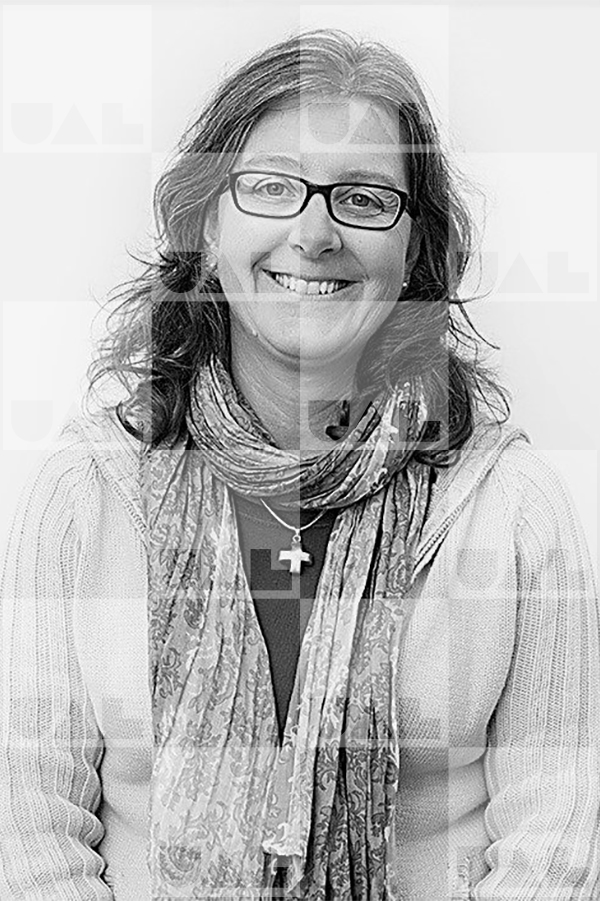 |
Flavio Barbini, M.A. in Architecture from the Politecnico di Milano (1991) and Ph.D. in Cities and Territories from ISCTE IUL – University Institute of Lisbon (2022), is currently a researcher at the DINAMIA Research Center and an Assistant Professor at the Universidade Autónoma de Lisboa. He previously served as Professor of Urban Planning and Landscape Architecture at the Politecnico di Milano (2013) and held various leadership roles at the Universidade Autónoma de Lisboa from 2009 to 2013. As the founder of barbiniarquitectos, he has led multidisciplinary projects in urban transformation, landscape architecture, sustainable design, and interior and furniture design in Portugal and Italy, earning national and international recognition. Barbini has also been a speaker at conferences in cities such as Lisbon, Milan, Venice, Marseille, Tel Aviv, Macau, and Shanghai. (www.estudoprevio.net). She has been a professor in the Department of Architecture in Universidade Autónoma de Lisboa since 2002. She is currently a lecturer on the PhD course in Universidade Autónoma de Lisboa. | 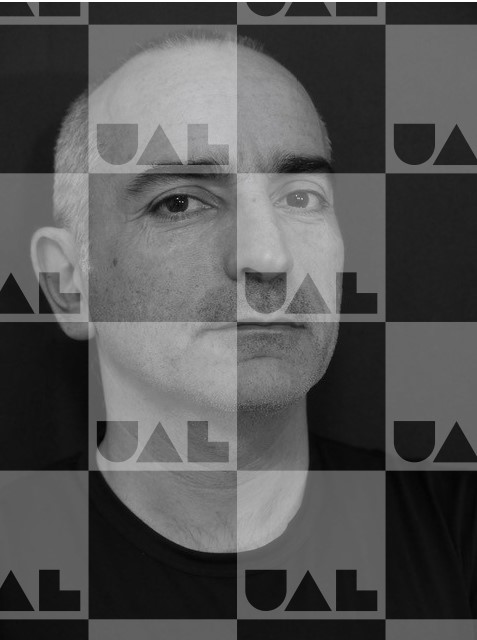 |
João Quintela is an architect, professor, and researcher. Holds a PhD in Architecture from Polytechnic University of Madrid (ETSAM) with the thesis “From Structural Logic to Spatial Poetics: The Concepts of Core-Form and Art-Form in Contemporary Architecture” and a Masters degree from Universidade Autónoma de Lisboa and Politécnico di Milano. He was a teaching assistant at UD Campo Baeza at ETSAM between 2012 and 2017 and since 2017 he has been Professor at UAL, where he teaches Drawing and a Seminar in Construction. Together with the German architect Tim Simon-Meyer he founded in 2012 the architectural office Atelier JQTS. They have been invited to develop workshops at different universities and art-architecture festivals such as the Cork University in Ireland (2016), Antwerp University in Belgium (2019, 2020), Walk and Talk Festival in the Azores (2017) or the Iminente Festival in Lisbon (2024). The work done by Atelier JQTS has received different prizes and nominations such as the ENOR Young Architecture Award (2024), the ARQUIA Innova Prize (2022) or a finalist for the Wissenhof Architektur Forderpreis V (2014). | 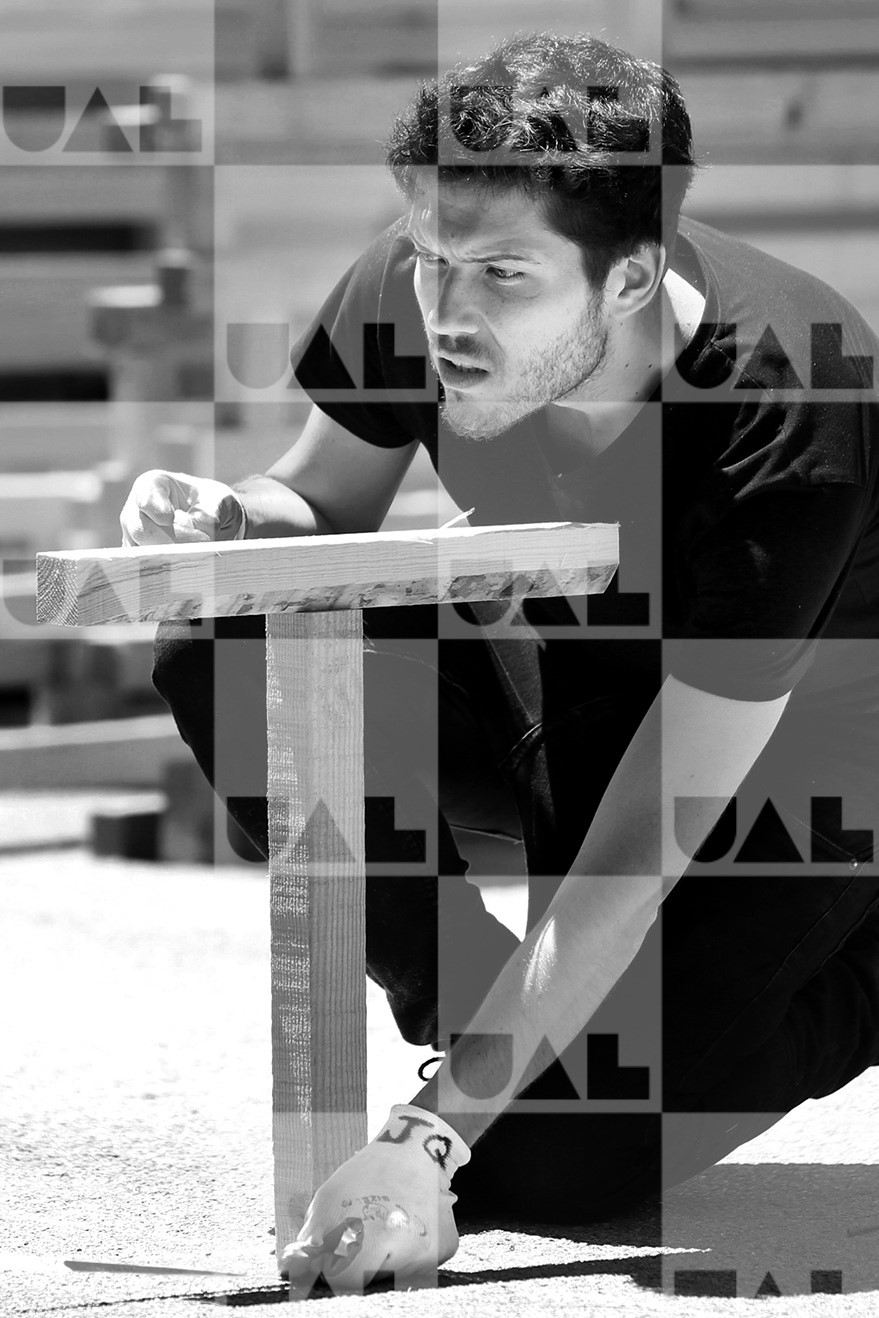 |
| Manuel Aires Mateus, architect, graduated from the Faculty of Architecture in Universidade Técnica de Lisboa. After a period spent working with architect Gonçalo Byrne, he and Francisco Aires Mateus founded the AIRES MATEUS firm in Lisbon (1988). He has been a professor at the Architecture Academy in Università della Svizzera Italiana (since 2001) and in Universidade Autónoma de Lisboa (since 1998). He has also lectured at design seminars in international universities, namely: the Faculty of Architecture in Ljubljana; Harvard Graduate School of Design; Oslo School of Architecture; Universidad de Navarra; College of Architecture, Art and Planning, Cornell University. His architectural work has been widely recognised, namely: at the Ibero-American Biennial of Architecture and Urbanism of Asunción (2019) and São Paulo (2016); Ecola Award (2019); the lledó Arquitectura Ibérica Prize (2018); the Wallpaper Design Award (2018); FAD Prize (Special Mention, 2008); Contract World Prize (2007); Enor Prize (2006); RS04 Residencia Singular (2004); Valmor Prize (2002). He was nominated for the European Union Prize for Contemporary Architecture – Mies van der Rohe Award (2009, 2013, 2017). His work has been extensively published – in monographs such as El Croquis, Arquitectura Viva, GA, A + U, 2G, C3, A.MAG – and he has been a regular presence at the Venice Architecture Biennale, with the exhibitions: Ground (2021); Field and the Portuguese Pavilion Public without Rhetoric (2018); Fenda (2016); Radix (2012); Voids and the Portuguese Pavilion No Place Like (2010). He has also exhibited at Ville et Culture in Rabat (2018); Milan Design Week (2017); Chicago Architecture Biennial (2017); and Centre de Création Contemporaine Olivier Debré CCCOD (2015). Courses taught: Research and Dissemination Methods, Thesis Project Laboratory E-mail: m@airesmateus.com | 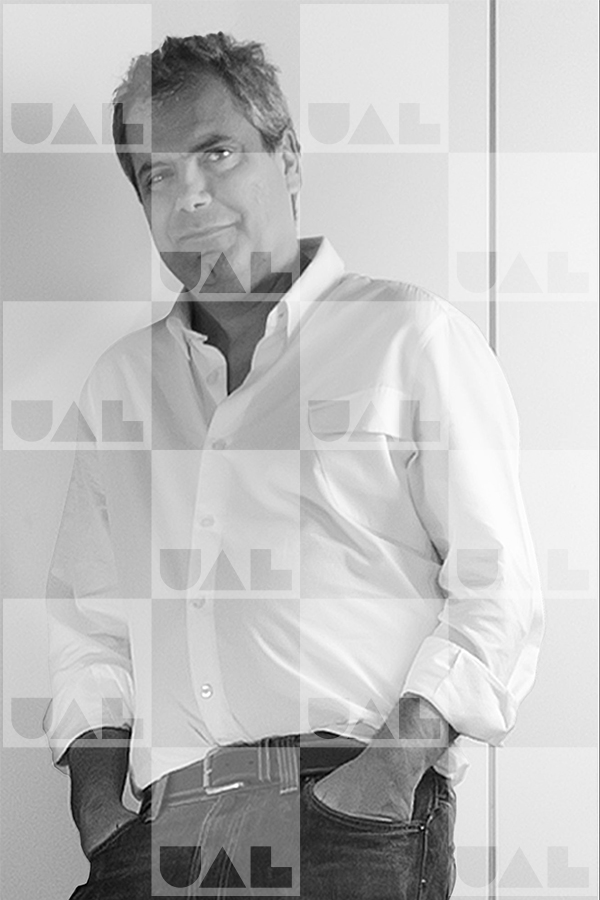 |
| Marta Sequeira has a professional degree in Architecture from the Faculty of Architecture in Universidade Técnica de Lisboa and a PhD in Architectural Projects from Escola Tècnica Superior d’Arquitectura de Barcelona – with a thesis on the Corbusian public space and its relationship with the Greek and Roman public space. With this thesis, she won the University Texts of Social and Human Sciences competition and the ICAR-CORA Prize for the Best Doctoral Thesis. She has written several books and essays on contemporary Portuguese architecture and international modern architecture, which have been published in Portugal, Spain, Italy, the United Kingdom, Germany, Lithuania, Colombia, Brazil, Argentina and the United States of America. She has received the Prix de la Recherche Patiente – the most prestigious international award on Corbusian Studies, awarded annually by Fondation Le Corbusier (Paris) – with the research presented in Towards a public space. Le Corbusier and the Greco-Latin tradition in the modern city, published by the multinational publishing house Routledge. She also won, with her architectural practice, the AZ Award of Merit 2019, and she was a finalist in the FAD Award in 2018 and 2019, as well as the BigMat International Architecture Award 2019. Courses taught: Contemporary Architecture Seminar II, Thesis Project Laboratory ORCID: https://orcid.org/0000-0001-8625-3049 Email: msequeira@autonoma.pt | 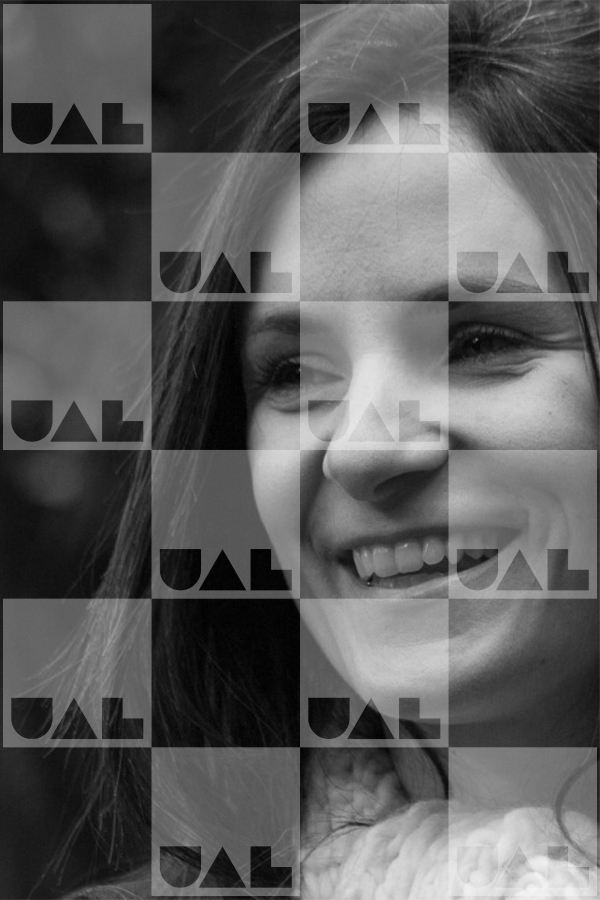 |
| He has a PhD in Architecture Theory and Practice from the Faculty of Architecture in Universidade de Lisboa (2013) and a master’s degree in Science in Architecture and Building Design from Columbia University (1989). He graduated in Architecture at the Faculty of Architecture in Universidade Técnica de Lisboa (1984). He worked with Peter Eisenman in New York from 1987 until 1991 and with Daniel Libeskind in Berlin in 1991 and he was the director of the Architecture Department in Universidade Autónoma de Lisboa (2004 – 2007). He is currently a professor at the Faculty of Architecture in Universidade de Lisboa and in Universidade Autónoma de Lisboa. He has taught in several different architectural schools in Portugal and abroad. He has lectured on the work of ARX in different countries and been on the panel of judges at several national and international architectural competitions and professional awards. In 1991, he founded ARX Portugal Arquitectos with José Paulo Mateus. The work done by ARX has received several prizes, selections, nominations and honourable mentions such as the International Architecture Awards – The Chicago Athenaeum, Prize in Architecture, International Association of the Art Critics, European Union Prize for Contemporary Architecture – Mies van der Rohe Award, FAD Award, Secil Prize, among others. ARX projects have been widely published in articles and referenced in specialist newspapers and journals around the world. He has also published some monographs, such as: Dez Obras, ARX Portugal Arquitectos, Casa Editrice Libria, Italy, 2020, ARX Portugal 1991-2015, Verbo, 2015, Brick is Red, Author Edition, 2013, Ílhavo Maritime Museum, Caleidoscópio, 2004, Realidade-Real, CCB,1993, and A Second Nature, Editorial Blau, 1993. Courses taught: Thesis Project Laboratory Email: nunomateus@arx.pt | 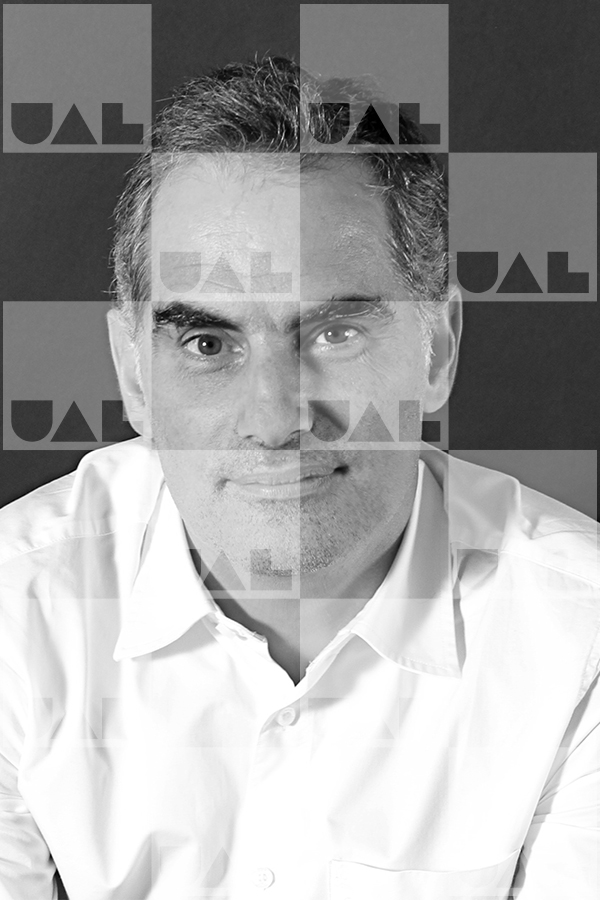 |
| Pedro Baía is an architect, editor, professor and researcher, the founder and director of the publishing house, Circo de Ideias, and architecture critic at the Público (since 2017) and O Primeiro de Janeiro (2007-2008) newspapers. He joined the editorial teams of Jornal Arquitectos (2013-2015) and NU magazine (2002-2004) and was the architecture editor of Artecapital (2008-2015). He is a member of AICA – International Association of Art Critics (since 2017) and of Friendly Fire (since 2010) and has written, edited and co-edited several books: Nuances: os lugares da arquitectura (2021), Manuel Correia Fernandes. 18 Obras (2021), A Recepção do Team 10 em Portugal (2020), Porto Brutalista (2019), Nuno Portas. 18 Obras Partilhadas (2019), a special issue of Joelho, “Team 10: Debate and Media in Portugal and Spain” (2019), Bartolomeu Costa Cabral. 18 Obras (2016), Koolhaas Tangram (2014) and Berlin: Critical Reconstruction (2008). He has been a researcher at Lab2PT in Universidade do Minho (since 2015) and CEACT/Universidade Autónoma de Lisboa (since 2021) and guest assistant professor at Escola de Arquitectura, Arte e Design, Universidade do Minho (2014- 2017; 2021), in Project 1, Architectural Theory 2 and Art and Contemporary Architecture Movements, and in Radical Thinking in Architecture (2021). He has a PhD in Architectural Theory and History from Universidade de Coimbra, with the thesis “From Broadcast to Reception: Reflections of Team 10 in the Portuguese Architectural Culture 1951-1981” (2014). Courses taught: Seminar on Editorial Practices ORCID: https://orcid.org/0000-0003-4582-919X Email: pedrobaia.arq@gmail.com | 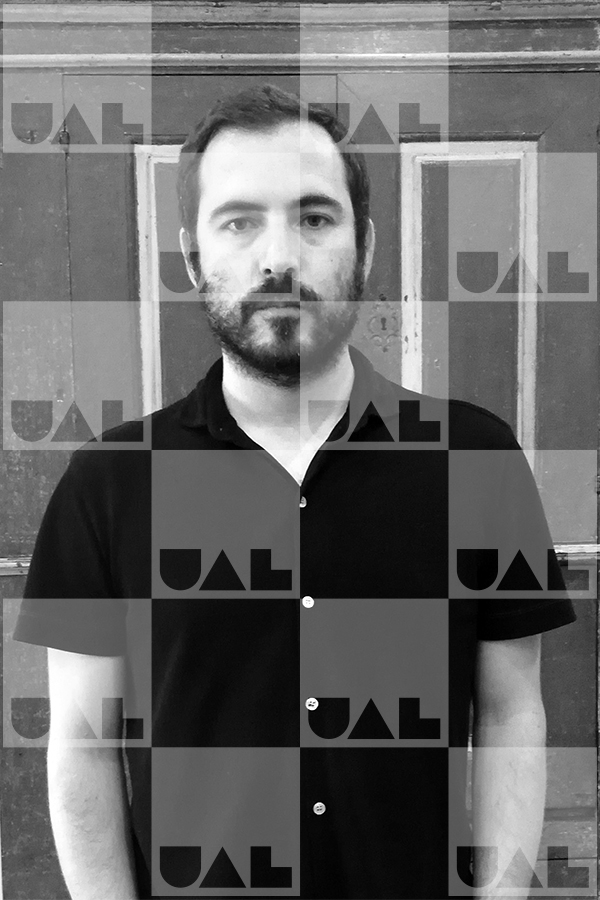 |
| Ricardo Carvalho is a professor of Architecture at the Department of Architecture in Universidade Autónoma de Lisboa and has been dean of the university since 2013. He has a degree in Architecture (Faculty of Architecture, Universidade Técnica de Lisboa, 1995), and has a PhD (Instituto Superior Técnico, Universidade de Lisboa 2012) on urban form and collective housing. He is also a practising architect with a studio, Ricardo Carvalho Architects & Associates, based in Lisbon. Ricardo was a visiting professor at BTU Brandenburg University (2009-2012), UNAV Escuela Técnica Superior de Arquitectura, Universidad de Navarra (2013), Carleton University (2016-2017) and Università Iuav di Venezia (2017 and 2021). He has published several books – A Cidade Social (Tinta-da-China 2016), Is Time a Raw Material? (IUAV 2017), Power/ Architecture (Lars Muller 2017) and Work Situation Process (A+A 2021) – and scientific articles and has curated exhibitions and organised scientific events. Ricardo’s work has been presented at exhibitions, such as “OVERLAPPINGS. Six Portuguese Architecture Studios” in the Royal Institute of British Architects in London (2009); “Portugal Convida” in FAD, Barcelona (2010); “Tradition is Innovation” in the Ozone design centre in Tokyo (2011); “Lisbon Ground” at the Venice Architecture Biennale (2012), “A Room for Mexico City” in Liga, Mexico City (2013) and “Haus Wittgenstein, Art, Architecture & Philosophy” at MAAT Museum, Lisbon (2018). He was nominated for the European Architecture Prize – the Mies van der Rohe European Award in 2015 and 2022 and for the Swiss Architectural Prize in 2020. Courses taught: Contemporary Architecture Seminar I Email: rcarvalho@autonoma.pt | 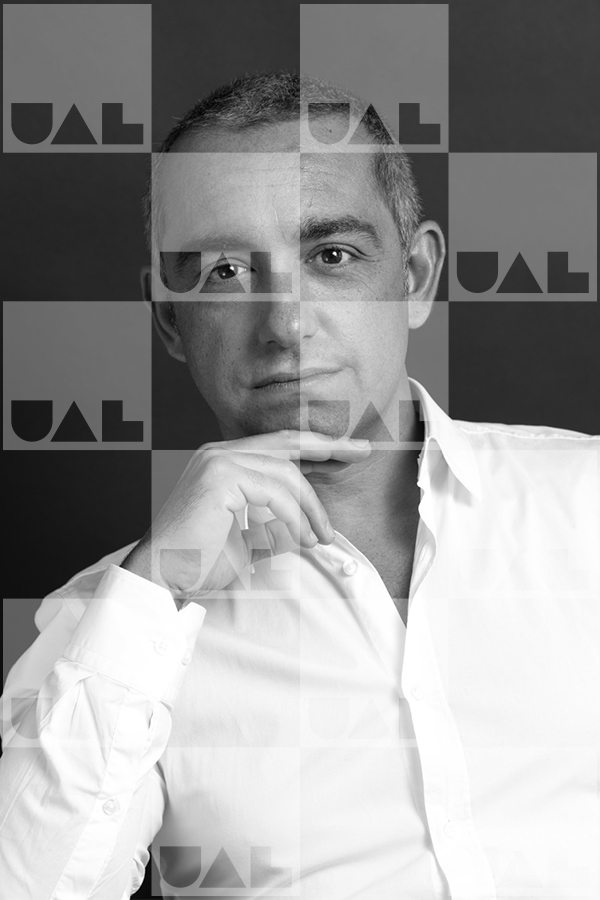 |
| Rute Figueiredo is an architect (Faculty of Architecture in Universidade Técnica de Lisboa) and architectural historian (MA in Art History, Universidade NOVA), who has long been studying the interplay between architecture and the institutions of critical mediation and discursive construction. She has a PhD in Sciences in Architecture from the ETH Zürich-Eidgenössische Technische Hochschule and was a Postdoctoral Research Fellow in Université Rennes 2. Author of the book Architecture and Critical Discourse in Portugal (José Figueiredo Prize 2008), she set up and coordinated the scientific project Site of Discourse, sponsored by Fundação para a Ciência e Tecnologia (2012-15). Her work has been funded by the Swiss National Scientific Foundation, ETH-Zurich, the European Union’s Horizon 2020, and Fundação para a Ciência e Tecnologia. She is an associate researcher at the scientific network Mapping Architectural Criticism and publishing editor of Histories of Post War Architecture journal. Rute is an integrated researcher at CEAA in Escola Superior Artística do Porto, working in the international consortium MODSCAPES (HERA) and co-coordinating the research axis Strong Relations: Studies on Architecture History, Theory and Criticism. She is currently a lecturer on the PhD course in Universidade Autónoma de Lisboa. Courses taught: Seminar on Curatorial Practices ORCID: https://orcid.org/0000-0003-1525-8429 Email: rfigueiredo@autonoma.pt | 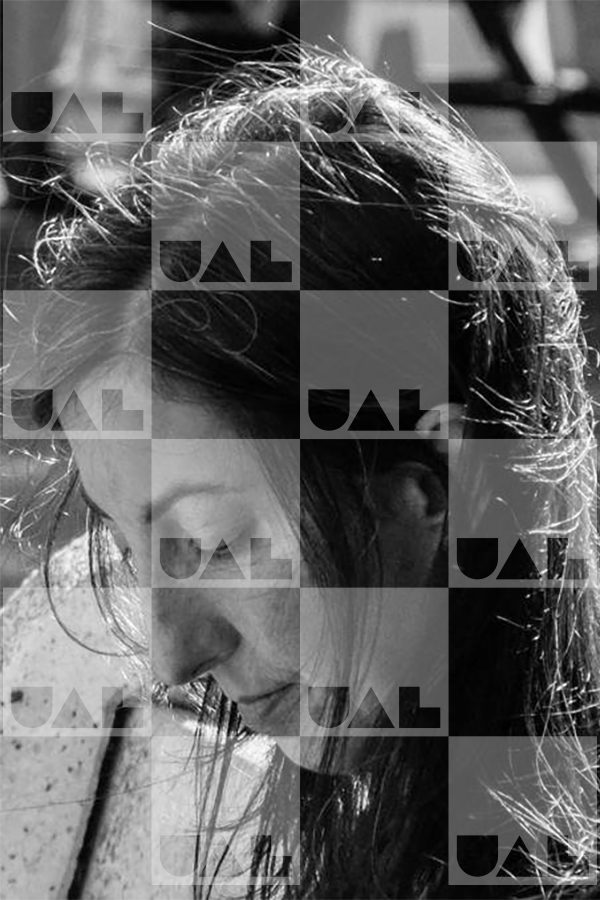 |

Filipa Ramalhete has a degree in Anthropology from the Faculty of Social and Human Sciences in Universidade NOVA, a master’s degree in Spatial Planning and Environment and a PhD in Environmental Engineering – Spatial Planning, from the Faculty of Science and Technology (FCT) in Universidade NOVA – with a thesis on Historical Centres and Land-Use Planning. She was an FCT postdoctoral researcher at the e-GEO research centre in Universidade NOVA. She has written several books and essays focused on interdisciplinary approaches to space and territory, both from applied and theoretical perspectives. She is an integrated researcher at CICS.Nova and the director of the CEACT/UAL research centre – where she has coordinated and taken part in numerous research projects with several institutional partners (e.g. Lisbon Neighbourhoods, Almirante Reis Atlas, in situ/, ASSIM – Activating Service-Sharing at InterMunicipal Scale) – and is the director of the journal, Estudo Prévio (www.estudoprevio.net). She has been a professor in the Department of Architecture in Universidade Autónoma de Lisboa since 2002. She is currently a lecturer on the PhD course in Universidade Autónoma de Lisboa.
Courses taught: Research and Dissemination Methods, Thesis Laboratory
Scientific Output: https://repositorio.ual.pt/search?spc.page=1&query=filipa%20ramalhete&f.author=Ramalhete,%20Filipa,equals
ORCID: https://orcid.org/0000-0002-6139-7676
Email: framalhete@autonoma.pt
 Flavio Barbini, M.A. in Architecture from the Politecnico di Milano (1991) and Ph.D. in Cities and Territories from ISCTE IUL – University Institute of Lisbon (2022), is currently a researcher at the DINAMIA Research Center and an Assistant Professor at the Universidade Autónoma de Lisboa. He previously served as Professor of Urban Planning and Landscape Architecture at the Politecnico di Milano (2013) and held various leadership roles at the Universidade Autónoma de Lisboa from 2009 to 2013. As the founder of barbiniarquitectos, he has led multidisciplinary projects in urban transformation, landscape architecture, sustainable design, and interior and furniture design in Portugal and Italy, earning national and international recognition. Barbini has also been a speaker at conferences in cities such as Lisbon, Milan, Venice, Marseille, Tel Aviv, Macau, and Shanghai. (www.estudoprevio.net). She has been a professor in the Department of Architecture in Universidade Autónoma de Lisboa since 2002. She is currently a lecturer on the PhD course in Universidade Autónoma de Lisboa.
Courses taught: Thesis Laboratory
Scientific Output: https://repositorio.ual.pt/search?spc.page=1&query=flávio%20barbini&f.author=Barbini,%20Flavio,equals
ORCID: https://orcid.org/0000-0002-6139-7676
Email: fbarbini@autonoma.pt
Flavio Barbini, M.A. in Architecture from the Politecnico di Milano (1991) and Ph.D. in Cities and Territories from ISCTE IUL – University Institute of Lisbon (2022), is currently a researcher at the DINAMIA Research Center and an Assistant Professor at the Universidade Autónoma de Lisboa. He previously served as Professor of Urban Planning and Landscape Architecture at the Politecnico di Milano (2013) and held various leadership roles at the Universidade Autónoma de Lisboa from 2009 to 2013. As the founder of barbiniarquitectos, he has led multidisciplinary projects in urban transformation, landscape architecture, sustainable design, and interior and furniture design in Portugal and Italy, earning national and international recognition. Barbini has also been a speaker at conferences in cities such as Lisbon, Milan, Venice, Marseille, Tel Aviv, Macau, and Shanghai. (www.estudoprevio.net). She has been a professor in the Department of Architecture in Universidade Autónoma de Lisboa since 2002. She is currently a lecturer on the PhD course in Universidade Autónoma de Lisboa.
Courses taught: Thesis Laboratory
Scientific Output: https://repositorio.ual.pt/search?spc.page=1&query=flávio%20barbini&f.author=Barbini,%20Flavio,equals
ORCID: https://orcid.org/0000-0002-6139-7676
Email: fbarbini@autonoma.pt João Quintela is an architect, professor, and researcher. Holds a PhD in Architecture from Polytechnic University of Madrid (ETSAM) with the thesis “From Structural Logic to Spatial Poetics: The Concepts of Core-Form and Art-Form in Contemporary Architecture” and a Masters degree from Universidade Autónoma de Lisboa and Politécnico di Milano. He was a teaching assistant at UD Campo Baeza at ETSAM between 2012 and 2017 and since 2017 he has been Professor at UAL, where he teaches Drawing and a Seminar in Construction. Together with the German architect Tim Simon-Meyer he founded in 2012 the architectural office Atelier JQTS. They have been invited to develop workshops at different universities and art-architecture festivals such as the Cork University in Ireland (2016), Antwerp University in Belgium (2019, 2020), Walk and Talk Festival in the Azores (2017) or the Iminente Festival in Lisbon (2024). The work done by Atelier JQTS has received different prizes and nominations such as the ENOR Young Architecture Award (2024), the ARQUIA Innova Prize (2022) or a finalist for the Wissenhof Architektur Forderpreis V (2014).
Courses taught: Thesis Laboratory
Scientific Output: https://repositorio.ual.pt/search?spc.page=1&query=Joao%20quintela&f.author=Quintela,%20João,equals
ORCID: https://orcid.org/0000-0003-1314-2158
Email: jquintela@autonoma.pt
João Quintela is an architect, professor, and researcher. Holds a PhD in Architecture from Polytechnic University of Madrid (ETSAM) with the thesis “From Structural Logic to Spatial Poetics: The Concepts of Core-Form and Art-Form in Contemporary Architecture” and a Masters degree from Universidade Autónoma de Lisboa and Politécnico di Milano. He was a teaching assistant at UD Campo Baeza at ETSAM between 2012 and 2017 and since 2017 he has been Professor at UAL, where he teaches Drawing and a Seminar in Construction. Together with the German architect Tim Simon-Meyer he founded in 2012 the architectural office Atelier JQTS. They have been invited to develop workshops at different universities and art-architecture festivals such as the Cork University in Ireland (2016), Antwerp University in Belgium (2019, 2020), Walk and Talk Festival in the Azores (2017) or the Iminente Festival in Lisbon (2024). The work done by Atelier JQTS has received different prizes and nominations such as the ENOR Young Architecture Award (2024), the ARQUIA Innova Prize (2022) or a finalist for the Wissenhof Architektur Forderpreis V (2014).
Courses taught: Thesis Laboratory
Scientific Output: https://repositorio.ual.pt/search?spc.page=1&query=Joao%20quintela&f.author=Quintela,%20João,equals
ORCID: https://orcid.org/0000-0003-1314-2158
Email: jquintela@autonoma.pt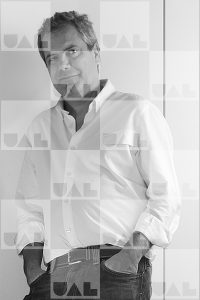
Manuel Aires Mateus, architect, graduated from the Faculty of Architecture in Universidade Técnica de Lisboa. After a period spent working with architect Gonçalo Byrne, he and Francisco Aires Mateus founded the AIRES MATEUS firm in Lisbon (1988). He has been a professor at the Architecture Academy in Università della Svizzera Italiana (since 2001) and in Universidade Autónoma de Lisboa (since 1998). He has also lectured at design seminars in international universities, namely: the Faculty of Architecture in Ljubljana; Harvard Graduate School of Design; Oslo School of Architecture; Universidad de Navarra; College of Architecture, Art and Planning, Cornell University. His architectural work has been widely recognised, namely: at the Ibero-American Biennial of Architecture and Urbanism of Asunción (2019) and São Paulo (2016); Ecola Award (2019); the lledó Arquitectura Ibérica Prize (2018); the Wallpaper Design Award (2018); FAD Prize (Special Mention, 2008); Contract World Prize (2007); Enor Prize (2006); RS04 Residencia Singular (2004); Valmor Prize (2002). He was nominated for the European Union Prize for Contemporary Architecture – Mies van der Rohe Award (2009, 2013, 2017). His work has been extensively published – in monographs such as El Croquis, Arquitectura Viva, GA, A + U, 2G, C3, A.MAG – and he has been a regular presence at the Venice Architecture Biennale, with the exhibitions: Ground (2021); Field and the Portuguese Pavilion Public without Rhetoric (2018); Fenda (2016); Radix (2012); Voids and the Portuguese Pavilion No Place Like (2010). He has also exhibited at Ville et Culture in Rabat (2018); Milan Design Week (2017); Chicago Architecture Biennial (2017); and Centre de Création Contemporaine Olivier Debré CCCOD (2015).
Courses taught: Research and Dissemination Methods, Thesis Project Laboratory
Email: m@airesmateus.com
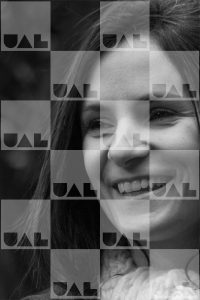
Marta Sequeira has a professional degree in Architecture from the Faculty of Architecture in Universidade Técnica de Lisboa and a PhD in Architectural Projects from Escola Tècnica Superior d’Arquitectura de Barcelona – with a thesis on the Corbusian public space and its relationship with the Greek and Roman public space. With this thesis, she won the University Texts of Social and Human Sciences competition and the ICAR-CORA Prize for the Best Doctoral Thesis. She has written several books and essays on contemporary Portuguese architecture and international modern architecture, which have been published in Portugal, Spain, Italy, the United Kingdom, Germany, Lithuania, Colombia, Brazil, Argentina and the United States of America. She has received the Prix de la Recherche Patiente – the most prestigious international award on Corbusian Studies, awarded annually by Fondation Le Corbusier (Paris) – with the research presented in Towards a public space. Le Corbusier and the Greco-Latin tradition in the modern city, published by the multinational publishing house Routledge. She also won, with her architectural practice, the AZ Award of Merit 2019, and she was a finalist in the FAD Award in 2018 and 2019, as well as the BigMat International Architecture Award 2019.
Courses taught: Contemporary Architecture Seminar II, Thesis Project Laboratory
ORCID: https://orcid.org/0000-0001-8625-3049
Email: msequeira@autonoma.pt
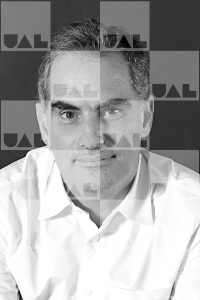
He has a PhD in Architecture Theory and Practice from the Faculty of Architecture in Universidade de Lisboa (2013) and a master’s degree in Science in Architecture and Building Design from Columbia University (1989). He graduated in Architecture at the Faculty of Architecture in Universidade Técnica de Lisboa (1984). He worked with Peter Eisenman in New York from 1987 until 1991 and with Daniel Libeskind in Berlin in 1991 and he was the director of the Architecture Department in Universidade Autónoma de Lisboa (2004 – 2007). He is currently a professor at the Faculty of Architecture in Universidade de Lisboa and in Universidade Autónoma de Lisboa. He has taught in several different architectural schools in Portugal and abroad. He has lectured on the work of ARX in different countries and been on the panel of judges at several national and international architectural competitions and professional awards. In 1991, he founded ARX Portugal Arquitectos with José Paulo Mateus. The work done by ARX has received several prizes, selections, nominations and honourable mentions such as the International Architecture Awards – The Chicago Athenaeum, Prize in Architecture, International Association of the Art Critics, European Union Prize for Contemporary Architecture – Mies van der Rohe Award, FAD Award, Secil Prize, among others. ARX projects have been widely published in articles and referenced in specialist newspapers and journals around the world. He has also published some monographs, such as: Dez Obras, ARX Portugal Arquitectos, Casa Editrice Libria, Italy, 2020, ARX Portugal 1991-2015, Verbo, 2015, Brick is Red, Author Edition, 2013, Ílhavo Maritime Museum, Caleidoscópio, 2004, Realidade-Real, CCB,1993, and A Second Nature, Editorial Blau, 1993.
Courses taught: Thesis Project Laboratory
Email: nunomateus@arx.pt
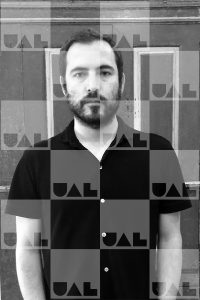
Pedro Baía is an architect, editor, professor and researcher, the founder and director of the publishing house, Circo de Ideias, and architecture critic at the Público (since 2017) and O Primeiro de Janeiro (2007-2008) newspapers. He joined the editorial teams of Jornal Arquitectos (2013-2015) and NU magazine (2002-2004) and was the architecture editor of Artecapital (2008-2015). He is a member of AICA – International Association of Art Critics (since 2017) and of Friendly Fire (since 2010) and has written, edited and co-edited several books: Nuances: os lugares da arquitectura (2021), Manuel Correia Fernandes. 18 Obras (2021), A Recepção do Team 10 em Portugal (2020), Porto Brutalista (2019), Nuno Portas. 18 Obras Partilhadas (2019), a special issue of Joelho, “Team 10: Debate and Media in Portugal and Spain” (2019), Bartolomeu Costa Cabral. 18 Obras (2016), Koolhaas Tangram (2014) and Berlin: Critical Reconstruction (2008). He has been a researcher at Lab2PT in Universidade do Minho (since 2015) and CEACT/Universidade Autónoma de Lisboa (since 2021) and guest assistant professor at Escola de Arquitectura, Arte e Design, Universidade do Minho (2014- 2017; 2021), in Project 1, Architectural Theory 2 and Art and Contemporary Architecture Movements, and in Radical Thinking in Architecture (2021). He has a PhD in Architectural Theory and History from Universidade de Coimbra, with the thesis “From Broadcast to Reception: Reflections of Team 10 in the Portuguese Architectural Culture 1951-1981” (2014).
Courses taught: Seminar on Editorial Practices
ORCID: https://orcid.org/0000-0003-4582-919X
Email: pedrobaia.arq@gmail.com
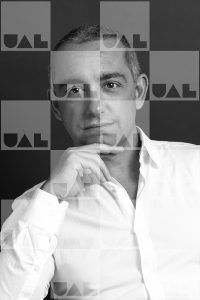
Ricardo Carvalho is a professor of Architecture at the Department of Architecture in Universidade Autónoma de Lisboa and has been dean of the university since 2013. He has a degree in Architecture (Faculty of Architecture, Universidade Técnica de Lisboa, 1995), and has a PhD (Instituto Superior Técnico, Universidade de Lisboa 2012) on urban form and collective housing. He is also a practising architect with a studio, Ricardo Carvalho Architects & Associates, based in Lisbon. Ricardo was a visiting professor at BTU Brandenburg University (2009-2012), UNAV Escuela Técnica Superior de Arquitectura, Universidad de Navarra (2013), Carleton University (2016-2017) and Università Iuav di Venezia (2017 and 2021). He has published several books – A Cidade Social (Tinta-da-China 2016), Is Time a Raw Material? (IUAV 2017), Power/ Architecture (Lars Muller 2017) and Work Situation Process (A+A 2021) – and scientific articles and has curated exhibitions and organised scientific events. Ricardo’s work has been presented at exhibitions, such as “OVERLAPPINGS. Six Portuguese Architecture Studios” in the Royal Institute of British Architects in London (2009); “Portugal Convida” in FAD, Barcelona (2010); “Tradition is Innovation” in the Ozone design centre in Tokyo (2011); “Lisbon Ground” at the Venice Architecture Biennale (2012), “A Room for Mexico City” in Liga, Mexico City (2013) and “Haus Wittgenstein, Art, Architecture & Philosophy” at MAAT Museum, Lisbon (2018). He was nominated for the European Architecture Prize – the Mies van der Rohe European Award in 2015 and 2022 and for the Swiss Architectural Prize in 2020.
Courses taught: Contemporary Architecture Seminar I
Email: rcarvalho@autonoma.pt
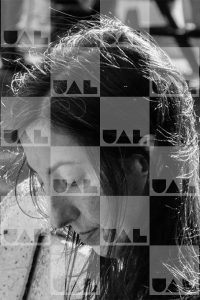
Rute Figueiredo is an architect (Faculty of Architecture in Universidade Técnica de Lisboa) and architectural historian (MA in Art History, Universidade NOVA), who has long been studying the interplay between architecture and the institutions of critical mediation and discursive construction. She has a PhD in Sciences in Architecture from the ETH Zürich-Eidgenössische Technische Hochschule and was a Postdoctoral Research Fellow in Université Rennes 2. Author of the book Architecture and Critical Discourse in Portugal (José Figueiredo Prize 2008), she set up and coordinated the scientific project Site of Discourse, sponsored by Fundação para a Ciência e Tecnologia (2012-15). Her work has been funded by the Swiss National Scientific Foundation, ETH-Zurich, the European Union’s Horizon 2020, and Fundação para a Ciência e Tecnologia. She is an associate researcher at the scientific network Mapping Architectural Criticism and publishing editor of Histories of Post War Architecture journal. Rute is an integrated researcher at CEAA in Escola Superior Artística do Porto, working in the international consortium MODSCAPES (HERA) and co-coordinating the research axis Strong Relations: Studies on Architecture History, Theory and Criticism. She is currently a lecturer on the PhD course in Universidade Autónoma de Lisboa.
Courses taught: Seminar on Curatorial Practices
ORCID: https://orcid.org/0000-0003-1525-8429
Email: rfigueiredo@autonoma.pt
The Centro de Estudos de Arquitetura, Cidade e Território (Centre of Architecture, City and Territory Studies) at Universidade Autónoma de Lisboa (CEACT/UAL) has been an independent research group since 2011 and promotes research related to the theory and practice of architecture. Its goals are: to contribute to improving quality in the theory and practice of architecture in Portugal; to produce and disseminate R&D projects in the area of architecture and land-use planning; to provide support to architecture students and professors in their academic practices; to support advanced training for human resources, particularly in the area of developing teaching careers and providing guidance for master’s and PhD projects; to hold seminars, conferences and activities to disclose the results of research and other projects developed under the scope of the master’s degree in architecture; to be part of international research projects, fostering the participation of researchers in R&D projects and international conferences; to promote the publication of scientific books and articles. Over the years, CEACT/UAL has developed academic and applied research projects and published several books. It also publishes the indexed journal, Estudo Prévio.
PhD Da/UAL – Public Lecture Series
The invencion of an architect: how Los Angeles shaped Frank Gehry
Jean-Louis Cohen
10/05/2023
PhD Da/UAL – Public Lecture Series
Herzon & de Meuron continuidad e invención
Luis Fernández-Galiano
08/03/2023
PhD Da/UAL – Public Lecture Series
Universum
Carlos Quintáns
11/01/2023
PhD Seminar Da/UAL – Public Lecture Series
Agricultural Modernization and Collective Memory: 50 Species-Towns
Charles Waldheim
12/10/2022
PhD Seminar Da/UAL – Public Lecture Series
Una mirada documental sobre el habitar
Arturo Franco
25/05/2022
PhD Seminar Da/UAL – Public Lecture Series
Architecture as Contact Zone: Towards Another Definition of Architectural Authorship
Tom Avermaete
17/05/2022
PhD Seminar Da/UAL – Public Lecture Series
O que aprendi com Peter Zumthor
Manuel Aires Mateus
11/05/2022
PhD Seminar Da/UAL – Public Lecture Series
A Casa de Siza (sine distantia)
João Luís Carrilho da Graça
04/05/2022
PhD Seminar Da/UAL – Public Lecture Series
Paulo Mendes da Rocha. Da Escola de São Paulo ao Museu Nacional dos Coches
Ricardo Bak Gordon
27/04/2022
PhD Seminar Da/UAL – Public Lecture Series
Mies-Bauhaus
Eduardo Souto Moura
06/04/2022
PhD Seminar Da/UAL – Public Lecture Series
Histories of Architecture Then and Now: Teory and Pratice in the Anthropocene
Anthony Vidler
23/03/2022
PhD Seminar Da/UAL – Public Lecture Series
The Drawing and the Design. An Experience of Archive
Nial Hobhouse
22/11/2021
PhD Seminar Da/UAL
Contemporary Architecture and Research
15/11/2021, 2:30 pm to 6:30 pm
Centro Cultural de Belém, Small Auditorium
The PhD course at the Department of Architecture in Universidade Autónoma de Lisboa focuses on reflection on contemporary architectural production. This course is intended to break with the distancing of academia from the present time – in the belief that the research produced in this field could become instrumental in the construction of what will, in the future, be the history of the times we are now living in. In this context, the first international seminar organised under the scope of this course is aimed at presenting the new PhD programme, showing three paradigmatic research projects and opening up debate on the utility of research into contemporary architecture.
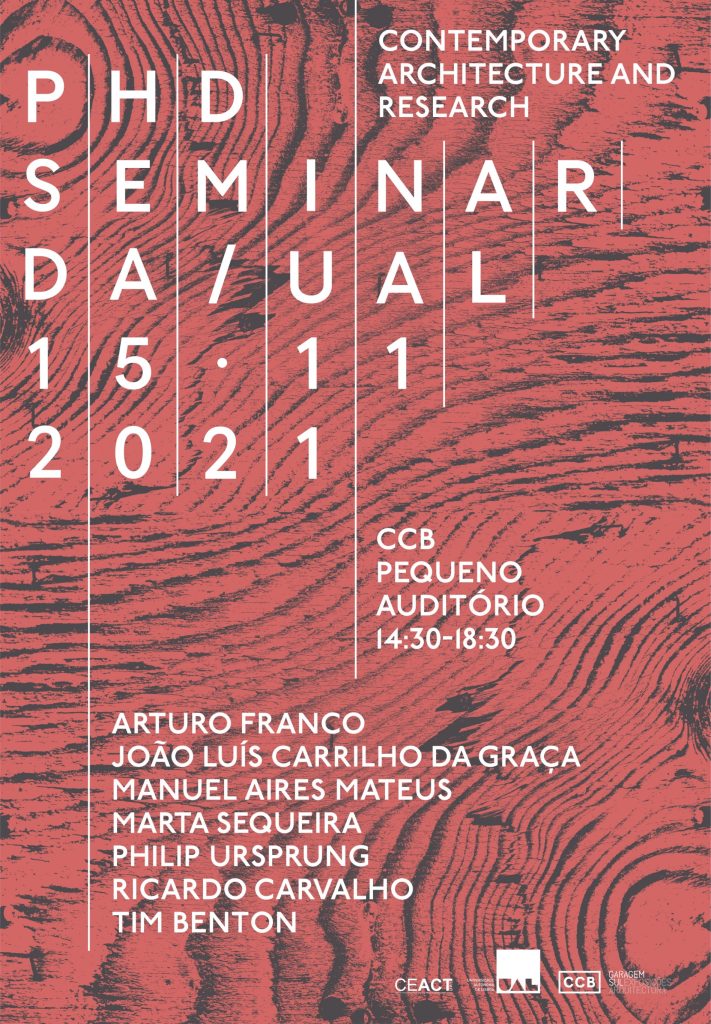
Casa da Arquitectura, Matosinhos
Drawing Matter, Yarlington
Fondation Le Corbusier, Paris
REQUIREMENTS
The following may apply for the PhD in Architecture:
- a) Holders of a master’s or legally equivalent degree in a field of knowledge compatible with architecture;
- b) Holders of a bachelor’s degree or candidates with a particularly relevant academic, scientific and/or professional career that is recognised by the Scientific Council in a reasoned opinion attesting to their capacity for engaging in these studies;
- c) Candidates with an academic, scientific and/or professional career that is particularly relevant and recognised by the Scientific Council in a reasoned opinion attesting to their capacity for engaging in these studies.
The recognition referred to in subparagraphs (b) and (c) falls under the competence of the Scientific Council, following a proposal from the Department of Architecture’s Scientific Commission, through a reasoned opinion attesting to their capacity for engaging in these studies; the purpose of this is solely for gaining access to studies leading to a PhD. It does not grant the holder any equivalence of bachelor or master’s degrees.
APPLICATION PROCESS
The application must be formalized at https://candidaturas.grupoceu.pt/cssnet/page. In case of doubt, ask for clarification by telephone.
Student secretary
Rua de Santa Marta, nº 58G
Opening hours: Monday to Friday from 9:30 am to 7:30 pm
Email: lferreirinho@autonoma.pt and hlopes@autonoma.pt
Phone: (+351) 21 317 76 00
Candidates should present following documents:
- a) Identification file;
- b) Diplomas held by the candidate;
- c) Curriculum Vitae (consisting of general information, academic qualifications and professional and/or scientific production);
- d) Portfolio (projects and/or publications).
ASSESSMENT CRITERIA
The programme accepts only 15 candidates per year in order to ensure excellence in teaching by the academic staff.
Candidates will be selected through a global assessment which will take the following parameters into account:
- a) Academic qualifications (20%)
- b) Career (40%)
- c) Interview (40%)
Candidates will be classified according to the points obtained and the final results will be published on the Universidade Autónoma de Lisboa internet page.
FEES
€4138,20 (1st year), €850 (2nd year), €850 (3rd year)
SCHOLARSHIPS
The first six in the classification process will be granted a scholarship in accordance with the regulations in force.
CALENDAR
Applications:
First phase – 1 September 2024 – 31 October 2024
Second phase – 1 November 2024 – 6 January 2025
Preliminary Results (including scholarship results):
First phase – 7 November 2024
Second phase – 13 January 2025
Final Results (including scholarship results):
First Phase – 18 November 2024
Second Phase – 23 January 2025
Start date:
10 March 2025
Rua Fernando Assis Pacheco nº 207 – 1350, Lisboa
+351 211 379 662
dp.arq@autonoma.pt